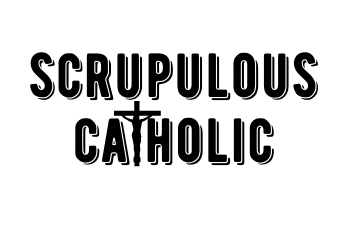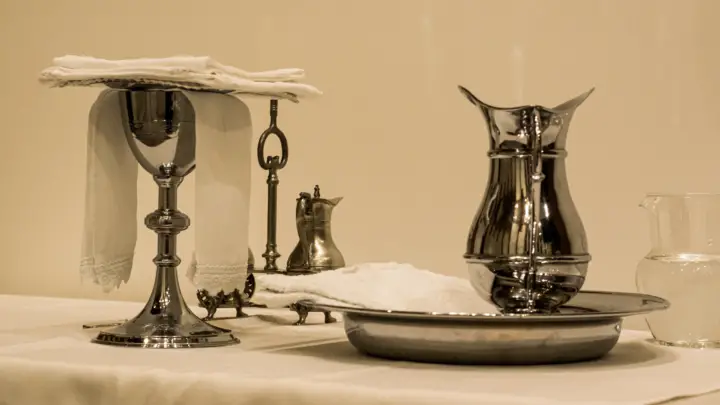If you are consistently unsure of receiving the Eucharist every time you go to Mass due to issues with Eucharistic Fasting, this is for you! I created this simple illumination to help Catholics, especially those who have OCD clear their doubts about fasting before Communion. Here is the Eucharistic Fasting Guide for the Scrupulous.
As Catholics, we are encouraged to fast before receiving the Lord in the Eucharist.
“One who is to receive the Most Holy Eucharist is to abstain from any food or drink, with the exception only of water and medicine, for at least the period of one hour before Holy Communion.” Canon No. 919
This could be easy for some, but for scrupulous, this is a big deal!
Doubt, about whether to receive the Eucharist or not because of breaking the Eucharistic fast, is due to fear. Fear of irreverence towards Him. Actually, this is not new since this is normal for the scrupulous.
Now, let’s dig deep to correct our distorted perception of this practice.
Here are some of the clarifications relating to Eucharistic Fasting.
The Eucharistic Fast is before Communion and not before the Mass
The one-hour rule is before the Holy Communion. Communion is a part of the Mass. It is when the faithful receive the Host. Meaning, you can still eat an hour before receiving the Communion and not before the Holy Mass.
The abstinence is from any food or drink
This is a bit tricky. But, let’s simplify this.
Food or drink refers to nutritious substances people eat or drink to maintain life or growth. It is our snack or meal. Therefore, according to Scrupulous Anonymous, snowflakes, lipstick, medicines even if flavored are not considered as food or drink.
Scrupulous individuals are strict. They are obedient when it comes to the dos and don’ts of the Church. The common concern here is unexpected happenings.
One example is the food particle that is stuck in the teeth. Scrupulous have the tendency to overthink whether this should stop them from receiving Communion.
This is one of the FAQs on the catholic answers forum before. An answer that I still follow was by a priest. He said, I still can receive Him. As long as you ate the food an hour before the reception, despite it getting stuck in your teeth, you can still accept Him.
To add, to break the fast, you must intentionally choose to eat or drink past an hour before receiving the Eucharist.
So if accidentally, raindrops fall into your mouth, rest assured that you can still receive Communion.
It is a devotional practice and not a moral obligation
Is it a mortal sin to break the Eucharistic Fast?
No. When we failed to fast, it does not mean that we are in a state of mortal sin.
This should be remembered because it could reduce the pressure for OCD individuals thus reducing also the obsession attached to Eucharistic fast.
It is what Scrupulous Anonymous says about this.
“That the Code itself notes exceptions to the application of the devotional practice clearly underlines the practice as a discipline of the Church.
It’s most certainly not a moral obligation that can’t be dispensed with and that must be upheld with due diligence.
Even in the most enthusiastically conservative interpretations of this law in all the journals, I
consulted, I was unable to discover any reference to sin or any canonical penalty.
All authors agree that the pre-Communion fast is primarily a devotional practice.”
Exposure and Response Prevention (ERP) Therapy
If you are currently struggling with scrupulosity in receiving the Eucharist, just like any other obsession, you can overcome it through Exposure and Response Prevention (ERP) Therapy.
It is the practice of exposing yourself to your obsession and not responding to it. By this, you are feeding your senses that it is okay not to react. That, nothing negative will happen.
As in the case of receiving the Eucharist, once you are having an irrational compulsion nudging you not to receive it, you have to do it still. Exposing yourself to doing it will help you fight against your compulsions and respond to them differently.
This Prayer Journal for Scrupulous can help you track and overcome your compulsion.
Conclusion
There is nothing wrong with being too cautious of our actions especially if they give reverence to God. But let us also be reminded that we are only human and subject to our own imperfections, thus it is necessary to trust God. Let us always depend on Him. If we do so, we are reducing our burdens and giving Him praises for our humility.
Doubting if your confession is valid or not? Here is a Confession Guide for Scrupulous.
For more resources on scrupulosity, you may want to check this out.
St. Alphonsus Ligouri, pray for us.


Bill McIntosh
Ok suppose I think but am not 100% sure that 60 minutes have elapsed since last eating or drinking (except for water) can I receive??
nicoleandrewmata
If you are scrupulous and in doubt, receive still.
Marlene
What if I have a bad blasphemous or evil thought during communion? Do I just ignore the horrible thought and still receive it? Or step out of line and confess?
nicoleandrewmata
No. Don’t step out of the line. Still receive. If confused, receive it.
Is it a sin to receive communion without fasting? - Resto NYC
[…] Eucharistic Fasting Guide for Scrupulous […]